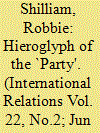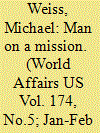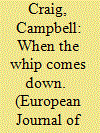| Srl | Item |
| 1 |
ID:
082745


|
|
|
|
|
| Publication |
2008.
|
| Summary/Abstract |
Questions about the agency of the Communist Party - especially its failure to effect and support radical social transformations - formed one crucial aspect of the socio-political context in which the agent-structure debate was rejoined by social scientists in the 1960s and 70s. Moreover, the Party had long existed as a hieroglyph for Marxist thought. And deciphering the historical importance of the Party in processes of world development required the theorisation of an inter-societal dimension to the agent-structure problem. I contend that using an Ideas in Context approach to the agent-structure debate in order to consider this pre-existing Marxist literature on the agency of the Party illuminates issues obscured in the progress of the debate in IR. To this effect I examine the seminal writings of Trotsky, C. L. R. James and Althusser in order to reveal how the debate, imported into IR in the late 1980s, was already framed by the problem of analytically and ethically coming to terms with the inter-societal dimension of socio-political transformation, especially when this dimension pushed to the fore the generative nature of inter-societal alterity manifested in the condition of - and `advantage' of - comparative backwardness. Crucially, the attempts made to decipher the hieroglyph of the Party are instructive in that they reveal foundational challenges for the intellectual production of knowledge of inter-societal alterity and its centrality to issues of continuity and change, the identification of structural constraints and sources of transformative agency
|
|
|
|
|
|
|
|
|
|
|
|
|
|
|
|
| 2 |
ID:
123056


|
|
|
|
|
| Publication |
2013.
|
| Summary/Abstract |
The article deals with Jewish revolutionaries in the Russian Empire from the 1880s until the October Revolution of 1917, approaching them through the prism of their identity crisis during a period of transition. The author's aim is to uncover the cultural and psychological mechanisms of Jewish radical motivation and to elucidate the factors which led to the formation of a radical consciousness and to growth in radical activity. Some of these mechanisms are universal, while others specifically characterize Jewish society in Russia. Equally essential are the modes of transformation of traditional Jewish concepts into the specific elements of revolutionary ideologies.
|
|
|
|
|
|
|
|
|
|
|
|
|
|
|
|
| 3 |
ID:
124916


|
|
|
|
|
| Publication |
2013.
|
| Summary/Abstract |
The article deals with Jewish revolutionaries in the Russian Empire from the 1880s until the October Revolution of 1917, approaching them through the prism of their identity crisis during a period of transition. The author's aim is to uncover the cultural and psychological mechanisms of Jewish radical motivation and to elucidate the factors which led to the formation of a radical consciousness and to growth in radical activity. Some of these mechanisms are universal, while others specifically characterize Jewish society in Russia. Equally essential are the modes of transformation of traditional Jewish concepts into the specific elements of revolutionary ideologies.
|
|
|
|
|
|
|
|
|
|
|
|
|
|
|
|
| 4 |
ID:
066290


|
|
|
|
|
| Publication |
London, Allen Lane the Penguin press, 1972.
|
| Description |
xxi, 488p.Hbk
|
| Standard Number |
0713902965
|
|
|
|
|
|
|
|
|
|
|
|
Copies: C:1/I:0,R:0,Q:0
Circulation
| Accession# | Call# | Current Location | Status | Policy | Location |
| 010505 | 923.247/TRO 010505 | Main | On Shelf | General | |
|
|
|
|
| 5 |
ID:
115059


|
|
|
|
|
| Publication |
2012.
|
| Summary/Abstract |
There, but for an accident of geography, stands a corpse!" thundered Max Shachtman-once known as Leon Trotsky's "foreign minister"-in New York City in 1950. By popular account, the line had been cooked up that night by a young Shachtmanite named Irving Howe; it ended the debate between the anti-Stalinist socialist Schachtman and his opponent, Earl Browder, former head of the Communist Party USA, who had been expelled from the party in 1946 at the behest of Moscow Central after suggesting that Soviet Communism and American capitalism might coexist after all.
|
|
|
|
|
|
|
|
|
|
|
|
|
|
|
|
| 6 |
ID:
153505


|
|
|
|
|
| Summary/Abstract |
This article examines the conflict between traditional Marxist attitudes toward war and the problem of the nuclear revolution. It shows how the advent of the nuclear revolution in the 1950s undermined traditional Marxist-Leninist concepts of war, and then goes on to argue that this development must be placed at the centre of contemporary Marxian IR if it is to have explanatory power in the twenty-first century. To make this case directly, it engages with Justin Rosenberg’s revival of Trotsky’s idea of uneven and combined development and its subsidiary law of ‘the whip of external necessity’, and argues that the whip can remain salient today only if one accepts the political utility of nuclear war. The impasse created by the nuclear revolution, it concludes, points Marxist IR in the direction of classic Marxist visions of supranationalism and human unity.
|
|
|
|
|
|
|
|
|
|
|
|
|
|
|
|